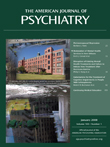In this issue of the Journal, Biederman and colleagues present the results of familial risk analyses of attention deficit hyperactivity disorder (ADHD) and psychoactive substance use disorders. The results of this trial are important in terms of furthering our understanding of the familial nature of these disorders.
ADHD is a common and highly impairing disorder. Although originally conceptualized as a disorder of childhood, we now know that about two in three children with ADHD go on to have persistence of significant symptoms into adulthood; the National Comorbidity Survey indicates that the prevalence of adult ADHD is 4.4% and that it commonly co-occurs with a variety of mental health disorders, including dysthymia, major depression, anxiety disorders, bipolar disorder, and psychoactive substance use disorders
(1) . Additionally, ADHD is commonly underdiagnosed and undertreated. A recent survey of a large prescription database found that only 0.8% of all adults were treated for ADHD
(2), and the National Comorbidity Survey Replication found that only 10.9% of adults with ADHD were treated for the condition in the year before the survey. In a survey of 1,001 adults with and without adult ADHD, Biederman et al. found lower rates of educational attainment, earned income, and employment and higher rates of divorce/separation and arrests in adults with ADHD
(3) . ADHD is known to have a high rate of familial transmission, with estimates of the heritability being about 75%
(4) . This high rate of heritability highlights the need for additional longitudinal familial studies of ADHD and comorbid disorders, such as the current article by Biederman et al.
The current article studied relatives from a longitudinal study of referred boys with and without ADHD (112 probands and 385 comparison subjects). The authors used structured blind assessments to stratify the cohort for the presence of ADHD, psychoactive substance use disorders, alcohol dependence, and drug dependence; they then performed familial risk analyses for the risks in first-degree relatives, parents, and siblings for these disorders. The findings from this study verified a number of prior observations and extended our understanding in a number of areas. The authors found that ADHD in the boys in this longitudinal study was significantly predictive of ADHD in their relatives, supporting prior work in the familial nature of the disorder. Boys who had ADHD with psychoactive substance use disorders or ADHD without psychoactive substance use disorders both had significantly higher observed rates of psychoactive substance use disorders in their relatives than comparison subjects without either ADHD or psychoactive substance use disorders. However, there is no evidence that ADHD and psychoactive substance use disorders were always transmitted together as a single entity. The psychoactive substance use disorders groups were then further analyzed into alcohol and drug dependence groups. Drug dependence in boys significantly increased the risk for drug dependence in the relatives, regardless of the presence of ADHD, whereas alcohol dependence in the relatives was predicted by the presence of ADHD occurring with alcohol dependence in the boys. ADHD in the boys was predictive of drug dependence in the relatives, and drug dependence in the probands conversely increased the risk for ADHD in the relatives. Finally, there was separate transmission of alcohol and drug dependence in families; no common risk for these two disorders was observed.
The authors concluded that the familial risk analyses suggested differing patterns of transmission for ADHD and drug and alcohol dependence. The association of ADHD and drug dependence was compatible with a common risk for these disorders by means of a variable expressivity, sometimes ADHD and sometimes psychoactive substance use disorders. However, ADHD and alcohol dependence seemed to have independent transmission. Their occurrence together does not reflect a common origin.
The findings of a common risk for ADHD and drug dependence and independent transmission for ADHD and alcohol dependence have numerous implications. These differing transmissions should be kept in mind in future familial studies of these disorders. Since the primary substance of dependence in this study was marijuana, it would be important to attempt to replicate these findings regarding transmission of ADHD and drug dependence in cohorts of patients who are dependent on other substances. Primary care physicians frequently attempt to screen for a variety of mental health disorders and have used the World Health Organization Adult ADHD Self-Report Scale v1.1 screener
(5) in identifying individuals at risk for adult ADHD. When physicians are attempting such screening for ADHD and psychoactive substance use disorders, it would be important to keep the potential differential familial transmission of ADHD and drug dependence versus ADHD and alcohol abuse in mind for patients with ADHD and their families. Furthermore, the finding highlights the need to identify ADHD in patients or relatives of patients presenting for psychoactive substance use disorders.

